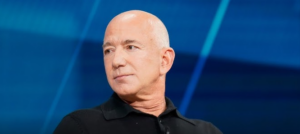In a significant shift, Jeff Bezos' Earth Fund has ceased funding for the Science Based Targets Initiative, prompting speculation about his climate strategy and rising interests in the defense sector.
Jeff Bezos Halts Major Climate Funding Amid Shift to Defense Investments

Jeff Bezos Halts Major Climate Funding Amid Shift to Defense Investments
Bezos' Earth Fund withdraws support from SBTi just as Trump exits the Paris Agreement.
Jeff Bezos' Earth Fund, valued at £8.06 billion, has abruptly ceased its financial support for the Science Based Targets Initiative (SBTi), a key international organization that assesses corporate emissions reduction aligned with the Paris Climate Agreement. This withdrawal coincides with former U.S. President Donald Trump's formal exit from the Paris Agreement, signaling a noteworthy pivot in Bezos' climate approach.
Previously one of SBTi's largest contributors, the Earth Fund provided a substantial £14.5 million grant in 2021, which is set to expire in 2024. This unexpected cessation of funds has left the SBTi in a lurch, prompting efforts to secure alternative funding sources for its validation services. This decision follows reports that indicated the Bezos Earth Fund and advisors close to former U.S. climate envoy John Kerry had encouraged a greater corporate focus on carbon credits, a subject that has ignited debates over its durability and effectiveness.
Despite the withdrawal from SBTi, Bezos is still actively engaged in climate-related efforts. At a recent summit hosted by the New York Times, he stressed the critical need for addressing environmental concerns. Moreover, his foundation continues to endorse initiatives such as the Greenhouse Gas Protocol and the World Resources Institute.
As Bezos alters his climate funding strategy, Amazon is simultaneously augmenting its footprint in the defense arena. The tech giant has recently obtained a £670,000 consultancy deal with the UK Ministry of Defence to evaluate advanced space-based communication systems. This venture is part of Amazon's satellite project, Project Kuiper, and is being pitched to UK Space Command as a means to align military, governmental, and private satellite networks.
Industry insiders have highlighted that Amazon's Kuiper team is proactively seeking contracts within the British defense industry, especially as the UK prepares to introduce a series of new communication satellites. This coincides with the imminent finalization of bidders for the £5 billion Skynet 6 military satellite program, where major aerospace players like Airbus and Lockheed Martin are competing. The British government is also weighing options for a £1 billion intelligence satellite framework.
In addition to its defense pursuits, Amazon has secured several contracts with the UK government for its AWS cloud services, further solidifying its role within Britain's digital and military infrastructure. Recently, the UK telecom regulator Ofcom has issued a license to Amazon, enabling the company to deliver satellite broadband services, intensifying competition with Elon Musk's Starlink.
As Amazon advances its investment in defense and space ventures while retracting its climate funding, questions linger regarding Bezos' broader strategic pivot. Nevertheless, one fact remains clear: his clout is expanding significantly across both the environmental and military domains.



















